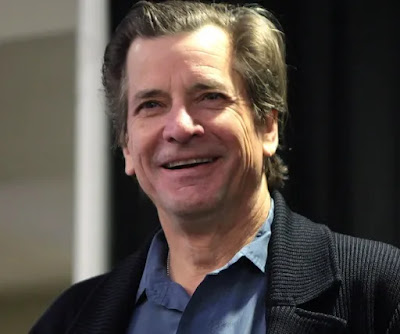I thought of titling this quick, impromptu blog post "Ten Reasons I Love Trains", then remembered how much I dislike this modern phenomenon of arbitrarily numbered lists.
Anyway, I love trains. Who doesn't? Breathes there a man with soul so dead...
But the appeal of the train is so specific, so many-sided, I feel compelled to write about what it means to me.
1) First off, a train is a sort of solid metaphor. A metaphor for what? For all sorts of things. For some reason, trains seem to be an inexhaustible source for analogies and figures of speech. Full steam ahead, off the rails, whistle-stop tour, the wrong side of the tracks, end of the line, one-track mind....I'm sure you could come up with a much longer list of train-related phrases that have entered the lexicon.
As a kid, I was wildly excited by the title of an wee-hours radio show called Night-Train. (My ambition was to listen to it all night, but I'm not sure I ever listened to a single minute of it.)
"Bye Bye Miss American Pie" (one of the few pop or rock songs my father liked) draws on railway imagery for its last verse, in a very memorable way:
And the three men I admire the most
The Father, the Son, and the Holy Ghost
They took the last train for the coast the day the music died.
Then there is "Slow Train Coming", a song and album by Bob Dylan, the Guns 'n' Roses song "Locomotive" (and indeed, "Night Train"), and...well, any number of others.
Trains also seem ideal for dramatizing the human situation. Recently, I watched the final episode of a series which dramatized one of the main characters' deaths by showing her taking a journey on a mysterious train, filled with all the people she'd known in her life. I'm sure a thick, thick book could be filled with similar examples.
2) The chug-chug-chug sound in the background. It's a rather pleasing sound, and it reminds you every moment that you are on a journey.
3) The fact that every train and every train-station is linked to a nationwide network of railways and railway stations. This creates a delicious awareness of the country around you, all the different cities and towns as part of a greater whole, a sense of opening horizons. The part, however, is not swallowed up in the whole. Each train station has its own atmosphere and identity. What a difference between a sleepy country station and a bustling city centre station!
4) A train isn't really a part of the environment through which it passes. It doesn't get caught in traffic or have people stopping it to ask for directions. This gives it a strangely disembodied, even dream-like atmosphere. You're there, but you're not there.
5) A train is a truly public transport. You are sharing a space with complete strangers, a space which invites rather than repels interaction. This might, admittedly, be a mixed blessing at times. But it makes possible protracted conversation between strangers, in a way that is almost impossible anywhere else except on a plane. And even if you don't talk, just sharing a carriage with others has a sociable element.
6) All the announcements, both in stations and on trains themselves. They are usually read by well-spoken people, and the elocution, pronunciation, and formality is a pleasure in itself. There is the poetry of place-names, as well as the poetry that settles on very ordinary phrases when they are used over and over: "Mind the gap" is probably the most famous example.
One of my favourite book titles of all time is The Ghost Now Standing on Platform One, an anthology of train-related ghost stories. The title obviously wouldn't work if the phrase was not such a familiar one.
7) A very particular idea, one which may be unique to me. I've noticed that whenever I'm reading a book of history, or any book where social and cultural trends are discussed, the image of a train always comes into my mind. History itself seems like a train, as well as all the constituent streams of history.
This image especially comes to my mind when I'm reading about the lead-up to the 1916 Rising, the Russian Revolution, or some similar great historic moment. (I mean "great" neutrally, of course.) When events are moving with great speed or momentum, the train seems like the only adequate metaphor.
Perhaps crucial to this association is the sense of strain. Trains always seem to be straining forward. I associate this same sense of strain with the events of history, which we might either be resisting or assisting. Perhaps it is my Irish nationalist background, but any history that is not the history of a struggle seems dull and uninspiring to me.
I could go on and on, but I might as well get off here.








